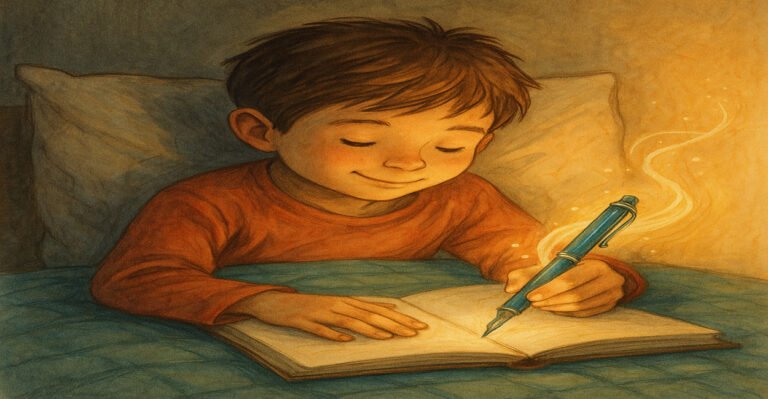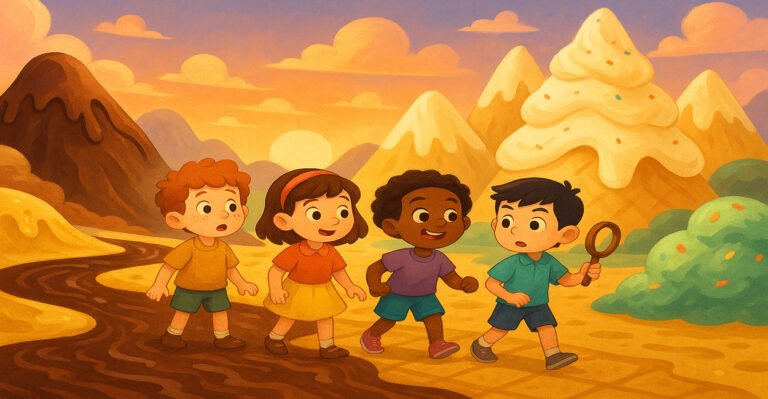Why Childhood Stories With Moral Lessons Matter Most
In a world filled with distractions and fast-paced living, the timeless charm of childhood stories with moral lessons continues to resonate. These narratives, often woven with enchanting characters and captivating plots, serve a purpose far beyond mere entertainment. They are the bedrock of our moral education, shaping our values and guiding our decisions from a young age. But why do these stories hold such significance? What makes them so compelling? In this blog, we will explore the importance of childhood stories with moral lessons, their impact on personal development, and how they can be a powerful tool for parents and educators alike.
The Allure of Stories
The Power of Narrative
Stories have an innate ability to captivate audiences. From the moment we hear the first few words, we are transported into a different world. This power of narrative is not just about entertainment; it’s about connection. Stories allow us to explore complex emotions, understand different perspectives, and engage with moral dilemmas in a safe environment.
Emotional Engagement
When we read or listen to a story, we often find ourselves emotionally invested in the characters. This emotional engagement is crucial, especially for children. It helps them relate to the characters’ struggles and triumphs, making the moral lessons more impactful. For instance, a child who reads about a character facing bullying may feel empathy and understand the importance of kindness and courage.
Cognitive Development
Childhood stories with moral lessons also play a significant role in cognitive development. They stimulate imagination and creativity, encouraging children to think critically about the world around them. As they navigate through various scenarios, they learn to make decisions, weigh consequences, and understand the importance of ethical behavior.
The Importance of Moral Lessons
Building Character
One of the primary reasons childhood stories with moral lessons are essential is their role in character building. These stories often present dilemmas that require characters to make choices, showcasing the consequences of their actions. For example, a story about honesty may illustrate how telling the truth can lead to trust and respect, while deceit can result in isolation and regret.
Instilling Values
Values such as honesty, empathy, respect, and responsibility are often embedded in these narratives. By exposing children to these principles through engaging stories, we help them internalize these values. This internalization is crucial as it shapes their behavior and decision-making processes as they grow older.
Encouraging Empathy
Empathy is a vital skill in today’s interconnected world. Childhood stories with moral lessons often highlight the importance of understanding others’ feelings and perspectives. When children read about characters who face challenges, they learn to empathize with those who are different from them, fostering a sense of community and compassion.
Encouraging Critical Thinking
Moral stories also encourage critical thinking. As children analyze the characters’ choices and the consequences that follow, they learn to evaluate situations from multiple perspectives. This skill is invaluable as they navigate the complexities of adulthood, where ethical dilemmas are often nuanced and multifaceted.
Types of Childhood Stories With Moral Lessons
Classic Fables
Fables are short stories that typically feature animals as characters and convey a moral lesson. Aesop’s Fables, for instance, are a treasure trove of wisdom. Stories like “The Tortoise and the Hare” teach the value of perseverance and humility, while “The Boy Who Cried Wolf” warns against dishonesty. These classic tales have stood the test of time, proving their relevance across generations.
Fairy Tales
Fairy tales often come with a moral twist. While they may be filled with magic and adventure, they also impart valuable lessons. For example, “Cinderella” teaches the importance of kindness and resilience, while “The Three Little Pigs” emphasizes the value of hard work and preparation. These enchanting stories not only entertain but also instill essential life lessons.
Modern Stories
In recent years, modern children’s literature has embraced the tradition of imparting moral lessons. Books like “The Giving Tree” by Shel Silverstein and “Last Stop on Market Street” by Matt de la Peña explore themes of generosity, gratitude, and social justice. These contemporary tales resonate with today’s children, making moral lessons relevant to their lives.
The Role of Parents and Educators
Storytelling as a Tool
Parents and educators can harness the power of childhood stories with moral lessons to facilitate discussions about values and ethics. Storytelling can be an interactive experience, allowing children to ask questions and express their thoughts. This dialogue not only reinforces the moral lessons but also encourages critical thinking.
Creating a Reading Culture
Fostering a love for reading is essential in helping children engage with moral stories. By creating a reading culture at home or in the classroom, parents and educators can introduce children to a variety of narratives that teach valuable lessons. Regular reading sessions, storytelling nights, and book clubs can make moral stories an integral part of a child’s life.
Encouraging Reflection
After sharing a story, it’s beneficial to encourage children to reflect on the moral lessons. Questions like “What would you have done in that situation?” or “How can we apply this lesson in our lives?” can stimulate thoughtful discussions. This reflection helps children internalize the lessons and understand their relevance in real-life situations.
The Lasting Impact of Childhood Stories With Moral Lessons
Shaping Future Generations
The impact of childhood stories with moral lessons extends far beyond the immediate moment of reading. These stories lay the groundwork for how children will approach challenges and relationships throughout their lives. As they grow, the values and lessons learned from these narratives become ingrained in their character, influencing their decisions and interactions with others.
Developing Critical Thinking Skills
Engaging with moral stories encourages children to think critically about right and wrong. As they analyze characters’ choices and the consequences that follow, they learn to evaluate situations from multiple angles. This skill is invaluable as they navigate the complexities of adulthood, where ethical dilemmas are often nuanced and multifaceted.
Fostering Resilience
Many childhood stories with moral lessons feature characters who face adversity and overcome challenges. These narratives teach children about resilience and the importance of perseverance. For instance, stories like “The Little Engine That Could” emphasize the power of determination and a positive mindset. By identifying with these characters, children learn that setbacks are a part of life and that they can overcome obstacles through hard work and belief in themselves.
The Role of Technology in Storytelling
Digital Storytelling
In today’s digital age, storytelling has evolved. With the rise of e-books, audiobooks, and interactive apps, children have access to a vast array of childhood stories with moral lessons at their fingertips. These platforms often incorporate engaging visuals and sounds, making the experience even more immersive.
Balancing Screen Time
While technology offers new ways to engage with stories, it’s essential to balance screen time with traditional reading. Parents and educators should encourage children to explore both digital and physical books, ensuring they experience the richness of storytelling in various formats.
Interactive Learning
Many educational apps and websites now offer interactive storytelling experiences that allow children to make choices for the characters, leading to different outcomes. This interactive element not only makes the stories more engaging but also reinforces the idea that our choices have consequences, a core theme in many moral lessons.
Explore More Stories at Storieslet
At Storieslet, we understand the profound impact that childhood stories with moral lessons can have on young minds. Our platform is dedicated to curating a diverse collection of stories that not only entertain but also educate. From classic fables to modern tales, our categories include moral stories, horror stories, bedtime stories, kids’ stories, classic stories, and fairy tales, ensuring there’s something for every reader.
Why Choose Storieslet?
Diverse Selection
Our extensive library features a wide range of stories that cater to different age groups and interests. Whether you’re looking for a heartwarming moral tale or an adventurous fairy tale, you’ll find it here.
Engaging Content
Each story is crafted to engage young readers, sparking their imagination while imparting valuable lessons. We believe that learning should be fun, and our stories reflect that philosophy.
Educational Resources
In addition to stories, we provide resources for parents and educators to facilitate discussions about the moral lessons embedded in each tale. Our goal is to create a community where storytelling becomes a shared experience that fosters growth and understanding.
Accessibility
With our user-friendly website, you can easily navigate through various categories and discover new stories that resonate with you and your children.
Conclusion
In conclusion, childhood stories with moral lessons are more than just tales to entertain; they are vital tools for personal development and ethical education. They help shape character, instill values, and foster empathy, all while engaging children’s imaginations. As we navigate an increasingly complex world, the lessons learned from these stories become even more crucial.
At Storieslet, we believe in the power of storytelling to transform lives. Our collection of moral stories is designed to inspire and educate, providing children with the tools they need to grow into compassionate, responsible adults. By sharing these narratives, we can ensure that the wisdom of the past continues to guide future generations.
So, the next time you sit down with a child to read a story, remember the profound impact it can have. Choose tales that not only entertain but also impart valuable lessons. After all, the stories we tell today will shape the values of tomorrow. Embrace the magic of childhood stories with moral lessons, and watch as they illuminate the path for young minds, guiding them toward.

Storieslet is a storytelling platform dedicated to bringing joy, learning, and imagination to readers of all ages. From bedtime stories for kids to fairy tales, moral lessons, and thrilling adventures, it offers a diverse collection of captivating narratives. Each story is carefully crafted to entertain, educate, and inspire young minds. With a blend of classic and modern tales, Storieslet ensures a magical reading experience for families. Discover enchanting stories and timeless lessons at Storieslet!







